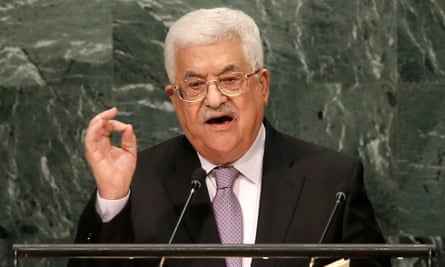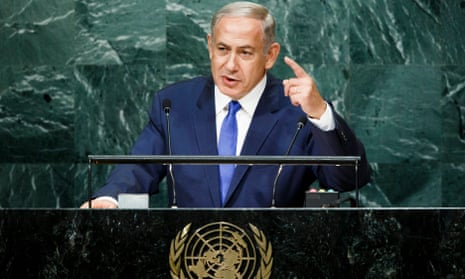Israeli and Palestinian leaders have traded pointed barbs at the UN general assembly, in a rhetorical exchange that underlines the deep differences between the two sides – and the dim prospects for meaningful dialogue.
Israel’s prime minister, Benjamin Netanyahu, invited the Palestinian leader, Mahmoud Abbas, to address the Israeli parliament and said he was willing to speak to the Palestinian legislative council in Ramallah. But Netanyahu insisted on Thursday that the central problem was Palestinian rejectionism, not Israeli settlements in the occupied territories.
The two leaders’ speeches reflected their very different personal styles, with Netanyahu relying heavily on the theatrical and confrontational style he has brought to his recent general assembly addresses that have seen him deploy props and, last year, a period of silence. For his part, Abbas called on the UN to declare 2017 – the 50th anniversary of the Israeli occupation of Palestinian territories – the year to end the occupation.
Speaking an hour before Netanyahu, Abbas told the general assembly that Israeli settlement expansion in the occupied West Bank was destroying “whatever possibility is left for a two-state solution”.
The outgoing UN general secretary, Ban Ki-moon, and the US president, Barack Obama, cited Israeli settlement-building as a threat to a two-state solution in their own speeches to the assembly earlier this week.

Netanyahu aimed his fire at what he described as Palestinian incitement, while denying it existed in Israeli society, and used the opportunity to accuse UN members of “obsessive bias” against Israel.
“The UN began as moral force, and has become a moral farce,” Netanyahu declared, adding that while the UN denounces Israel, the US supports it. The Israeli prime minister saved his heaviest criticism for allegations levelled at the Palestinian Authority, claiming it had no interest in peace.
“This remains the true core of the conflict: the persistent Palestinian refusal to recognise the Jewish state in any boundary,” he said, in a direct contradiction of Abbas.
“This conflict has never been about the settlements or about establishing a Palestinian state,” Netanyahu told the UN.
Netanyahu added that Israeli cities Haifa, Jaffa and Tel Aviv were “the real settlements they are after”.
The issue of settlements in the West Bank was nonetheless real, he conceded, adding that it “can and must be resolved in final negotiations, final-status negotiations”.
Netanyahu’s comments came despite the fact that Abbas had reiterated his view of Palestinian recognition of Israel in his speech. Abbas said: “I say to him [Netanyahu] today that our 1993 recognition of the existence of the state of Israel, a recognition which remains valid to this moment, is not a gratuitous recognition.”
In his speech, Abbas also reiterated his demand from the British government that it apologise for the 1917 Balfour declaration that agreed to the establishment in principle of a Jewish state in Palestine. “This is the least Great Britain can do,” he said.
Israeli-Palestinian peace talks last collapsed in 2014 and there are few hopes for a resumption anytime soon, in part because of Israel’s anger at Palestinian violence and Palestine’s criticism of settlements constructed on occupied land where it wishes to establish a state.
On the issue of peace talks, Abbas said: “Our hand remains outstretched for making peace”, but questioned whether any Israeli leader was ready to make “a true peace … that will abandon the mentality of hegemony, expansionism and colonisation”.
Abbas accused Israel of “continuing to evade” an international conference that France wants to hold before the end of the year, to focus on a framework and timeline for ending the occupation.
